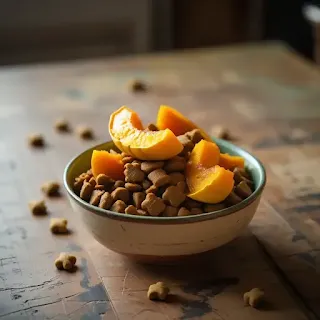- Get link
- X
- Other Apps
- Get link
- X
- Other Apps
Can Dogs Eat Squash?
Yes, dogs can eat squash. It is a nutritious food and is good for dogs' vision, immune system and heart health. Wash , cook and remove the seeds of squash before giving it to your dog. Cooked and cleaned butternut squash, spaghetti squash, pumpkin, and zucchini are all fine to give to your dog. It's also a good source of carbohydrates and should be given as part of a balanced diet.- Nutritional Value of Squash
- Types of Squash Safe for Dogs
- Health Benefits of Squash for Dogs
- Potential Risks of Squash for Dogs
- How Much Squash is Too Much?
- How to Safely Feed Squash to Your Dog?
- Homemade Dog Food Recipes with Squash
- Signs of Overfeeding Squash
- Can Dogs Eat Squash Every Day?
- Is Pumpkin Better Than Squash for Dogs?
- Raw vs Cooked Squash for Dogs: Which Is Better?
- Can Diabetic Dogs Eat Squash?
- Can Dogs Eat Squash Skin and Seeds?
- Conclusion
- FAQs
Nutritional Value of Squash
Carbohydrates:
Squash is filled with carbohydrates, it provides energy to dogs. Winter squashes tend to be higher in carbohydrates than summer squashes.Vitamin A:
Vitamin A is higher in winter squashes such as butternut and acorn, than summer squash like zucchini. Vitamin A is crucial for vision, immune function, cell growth, and skin health.Vitamin C:
Vitamin C is essential for the immune system and helps in cell repair and wound healing. Summer squashes like zucchini are good sources.Potassium:
Potassium present in squash is very important for maintaining healthy blood pressure, nerve functioning, and muscle contractions.
Manganese:
The manganese present in squash plays a role in bone health, metabolism, and antioxidant defense.
Calcium and Iron:
Calcium and Iron present in squash is Important for proper bone health and carrying oxygen in the blood.Fiber:
Fiber in squash is very helpful in digestion and helps maintain regular bowel movements and it also provides a feeling of fullness and regulates blood sugar levels.Antioxidants:
Antioxidants protect the cells against damage and may reduce the risk of chronic diseases.Water:
Squash is a water rich veggie and it's very good in summers and also the dog remains hydrated.Types of Squash Safe for Dogs
- Butternut Squash
- Zucchini
- Pumpkin
- Spaghetti Squash
- Acorn Squash
Health Benefits of Squash for Dogs
High in Fiber:
Squash is high in fiber, fiber helps in digestion and maintaining regular bowel movements and aids in weight management by providing a feeling of fullness.Packed Nutrients:
Squash is packed with nutrients such as vitamin A which is good for vision and skin ,vitamin C which makes the immune system robust and potassium which is needed for muscle and nerve functioning, along with magnesium and manganese.Low in Calories:
Squash is a great low-calorie treat that is packed with nutritious value.Supports Eye and Skin Health:
Beta-carotene present in squash contributes to good vision and healthy skin, particularly beneficial for older dogs.Digestive Health:
Water and fiber work together to keep the digestive tract healthy and regular.Weight Management:
Its low-calorie, high-fiber, and high-water content can help overweight dogs feel fuller.Hydration:
Your dog's fluid intake can be increased and dehydration can be avoided thanks to the high water content.Potential Risks of Squash for Dogs
Here are the key points regarding feeding squash to dogs:Allergies:
Some dogs may be allergic to squash and may lead to paw licking, sneezing, hot spots or sensitivities. Always look for reactions after feeding squash to your dog.Stomach Upset:
If your dog has consumed too much squash it can lead to digestive issues like loose stool, diarrhea or key. Always feed in moderation excess of any food is harmful for dogs.Digestive Issues (Seeds & Skins):
Seeds and skins of squash can cause a choking hazard and can be difficult to digest especially for small dogs. Always remove the seeds and skins before giving them to your dog.
Seasoning:
Any kind of seasoning such as salt, butter, oil etc. can be harmful for dogs. Only feed plain, cooked squash to avoid any problems.Raw vs. Cooked:
Cooked squash is easier for dogs to digest and generally more palatable than raw squash.Consult Your Vet:
If you notice any signs of allergy or digestive upset after feeding squash, or if you plan to significantly change your dog's diet, consult with your veterinarian.How Much Squash is Too Much?
Smaller dogs-1-2 tablespoonsLarger dogs - 3-4 tablespoons
How to Safely Feed Squash to Your Dog?
Here are the key points for safely feeding squash to your dog:
Opt for Organic Squash :
Organic squash reduces the risk of pesticides and other germs.Wash Properly:
Always wash the squash properly, washing will remove the dirt and potential germs from the squash before preparation.Remove the Seeds:
Always remove the seed and the skin , they may cause choking or digestive problems ,so it is always advised to remove the seeds and peel of squash.Cook Properly:
Always cook the squash properly without any seasoning such as salt, butter, oil and spices such as onion and garlic to avoid choking and stomach problems.Methods of Cooking:
Always steam, boil, or roast squash without oils or seasonings before feeding it.Moderation:
Squash is nutritious but its excess consumption may be harmful so always feed it in moderation as part of a balanced diet, not a meal.Homemade Dog Food Recipes with Squash
- Try this simple recipe:
- 1 cup cooked butternut squash
- 1/2 cup cooked rice
- 1/2 cup boiled chicken
- Mix together and serve in moderation.
Signs of Overfeeding Squash
- Diarrhea
- Gas
- Reduced appetite
Can Dogs Eat Squash Every Day?
Yes, dogs can eat squash everyday but only in moderation, excess can lead to stomach problems. If given as a part of a balanced diet dogs can benefit from its nutrients such as vitamins A and C, fiber ,carbohydrates ,calcium ,iron and water. Feed cooked portions mixed with their regular meals but cook without any seasoning.Is Pumpkin Better Than Squash for Dogs?
Here's a point-by-point comparison of pumpkin and squash for dogs:Benefits of Pumpkin:
Aids in Digestion:
Pumpkins are rich in fiber and help digestion and regular bowel movements and help with both diarrhea and constipation.Nutrient-Rich:
Pumpkin is filled with vitamins A, C, and E, as well as potassium and iron.Low in Calories:
Pumpkins are low in calories.Benefits of Squash (Butternut, Acorn, Yellow):
Nutritious:
Squash is rich in fiber, vitamins, carbohydrates ,calcium ,iron and antioxidants.Less Concentrated Fiber:
May not be as effective as pumpkin for digestive issues.Flavor and Texture Variety:
Offers more options for picky eaters or dietary changes.One can choose as per their dog's needs.
Raw vs Cooked Squash for Dogs: Which Is Better?
Cooked squash is the safer and healthier option for dogs compared to raw squash. Here's why:Cooked Squash
Easy to Digest:
Cooked squash is easy to digest for dogs ,especially for puppies. Raw squash can be difficult to digest.
Soft:
Cooked squash is soft and is easy for small and older dogs to chew or swallow, especially for dogs with dental issues.Palatable:
Cooked squash is more tasty and dogs are more likely to enjoy cooked squash because of the taste and texture. It blends well with their regular food.
Raw Squash
Difficult to Digest:
Raw squash can be difficult to chew and digest for dogs. They may also possess a choking risk or cause an intestinal blockage in extreme cases.
Digestive Problems:
Certain dogs may experience gas, bloating, or diarrhea after consuming raw squash because of the tough fiber and enzymes that aren’t broken down through cooking.
Bland :
Many dogs simply don’t enjoy raw squash, which can make feeding time a struggle.
Always opt for cooked squash when feeding your dog. It’s not only safer but also much more beneficial in terms of digestion and taste.
Can Diabetic Dogs Eat Squash?
Yes, diabetic dogs can eat squash, but in moderation. Squash due to its high fiber content can help in controlling blood sugar levels. However, always consult your veterinarian before regularly feeding it to your diabetic dog.
Can Dogs Eat Squash Skin and Seeds?
No, dogs cannot eat squash skin and seeds. The skin and seeds can be hard to chew and digest , especially if it's not cooked properly. The seeds may also cause choking hazards or digestive problems. It is always advised to remove the skin and seeds before feeding it to your dog.
Conclusion
Yes, dogs can definitely eat squash! It's a tasty and healthy addition to their diet when fed in moderation and cooked properly without any seasonings.. From butternut to zucchini and pumpkin, the fiber, vitamins, and low calories in squash can be beneficial for your furry friend.
FAQs
Can dogs eat squash safely?
Yes, dogs can safely eat squash in moderation. It should be cooked and served plain, without added salt, spices, or butter.Is squash good for dogs?
Yes, squash is rich in fiber, vitamins A, C, and B6, and antioxidants that can benefit your dog's digestion and immune system.Can dogs eat raw squash?
While not toxic, raw squash is harder to digest. It’s best to cook it before feeding it to your dog.How much squash can I give my dog?
Start with 1–2 tablespoons for small dogs and up to ½ cup for larger dogs. Always monitor your pet for any digestive upset.Can dogs eat squash every day?
Dogs can eat squash frequently, but it should be part of a balanced diet and not a daily replacement for regular dog food.Which types of squash are best for dogs?
Butternut squash, acorn squash, and pumpkin are dog-safe and provide health benefits when prepared properly.Can squash help dogs with constipation?
Yes, the fiber in squash may help relieve mild constipation and support healthy digestion.Should I remove the squash skin and seeds before feeding it to my dog?
Yes, the skin and seeds can be tough and pose a choking hazard or digestive issues. Always peel and deseed squash before serving.- Get link
- X
- Other Apps



.webp)
.webp)


Comments
Post a Comment